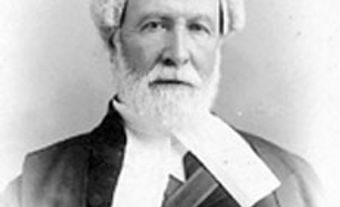Clark, Glen David
Glen David Clark, politician, premier of BC from 1996 to 1999 (b at Nanaimo, BC 22 Nov 1957). Clark studied politics at Simon Fraser University and the University of British Columbia and worked as a union organizer in the Lower Mainland before seeking elected office. He was successful in his first bid for a seat in the legislature in the 1986 general election for the provincial NEW DEMOCRATIC PARTY (NDP) in Vancouver while still in his 20s. Young and eager, he was a constant thorn in the side of the Social Credit government.Re-elected in the NDP landslide in 1991, Clark was rewarded by premier Mike HARCOURT with a Cabinet appointment as Minister of Finance and Corporate Relations. In addition Clark was named Government House Leader. Clark oversaw much of the NDP government's successful attempts to right the province's budgetary nightmare. In 1993, he was moved to the Employment and Investment Ministry. Clark seemed untainted by the scandal that had forced Harcourt's resignation. He secured a first ballot victory in the leadership contest on 18 February 1996 and was sworn in as premier days later on 22 February 1996.
With a forceful handling of yet another scandal, this one involving improper practices by BC Hydro officials, Clark began to erase a 20-point deficit in the polls. He ran an energetic, aggressive campaign and emerged with a slight majority in the election on 28 May 1996. It was the first time the BC NDP had managed consecutive election victories in the province. Although Clark's government completed the much-anticipated Vancouver Island Highway Project on the island, successes during Clark's term were few. His government's decision to upgrade BC Ferries' service and to stimulate western Canada's shipbuilding industry were dismal failures. The BC Ferries project vastly exceeded its budget but neither improved ferry service nor the quality of the fleet or wait times in ports. Clark's plan to have Vancouver ship builders lead the industry in creating a "fast ferry" - a high-speed passenger catamaran - failed in what has since been dubbed the Fast Ferry Scandal or FastCat Fiasco. Critics subsequently claimed that these initiatives were an attempt to gain political support from the NDP's union supporters, and Clark's refusal to cancel the program increased scrutiny on the NDP, further damaging its reputation.
Clark resigned suddenly on 21 August 1999 after allegations of criminal behaviour, including claims that he had accepted personal favours (home renovations) from businessman Dimitrios Pilarinos in return for the government's approval of Pilarinos's casino application. An emergency caucus meeting followed after public support for the NDP dove to nearly 16% and Dan Miller was elected interim leader. It tried to distance itself from the controversy of the Clark administration and to rebuild its popularity under the next leader, Ujjal Dosanjh, but the crippled party was unable to defeat Gordon CAMPBELL's Liberals, who won the 2001 election. The Supreme Court acquitted Clark of the charges in 2002 after ruling that there was insufficient evidence to prove Clark had used his power as premier for personal gain.
Clark retired from political life shortly after and entered the private business sector. In 2005 he became Executive Vice President of the Jim Pattison Group, and in 2009 he was made a member of the Board of Directors of Canfor.

 Share on Facebook
Share on Facebook Share on X
Share on X Share by Email
Share by Email Share on Google Classroom
Share on Google Classroom

